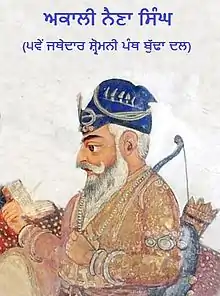Naina Singh (Jathedar)
Naina Singh (fl. 18th century), also known as Narayan Singh,[1][note 1] was a Nihang warrior and fifth Jathedar of Budha Dal and a chief of the Shaheedan Misl during the late 18th century.[2][3][4]
Akali Naina Singh Nihang | |
|---|---|
 Jathedar Akali Baba Naina Singh Nihang | |
| Born | Narayan Singh 1736 Khudi kurd, Barnala |
| Known for | Fifth Jathedar of Budha Dal |
| Predecessor | Jassa Singh Ahluwalia |
| Successor | Akali Phula Singh |
Biography
Early life
Very little is known or can be assured about the early life of Naina Singh.[4] He was born as Narayan Singh around 1736, into a Sidhu Jat family, in Khudi Kurd located in Barnala district.[3][4] According to Harbans Singh, he must have been alive in or before 1734, the year Baba Darbara Singh passed away, because Naina Singh had received the Pahul rites under the supervision of Darbara Singh.[4]
_and_Naina_Singh_(right)_from_Gurdwara_Baba_Atal.jpg.webp)
He was also caretaker of Darbar Sahib. He learned Gurbani and martial skills from Baba Deep Singh. He became associated with the Shaheedan Misl.[1] He joined Budha Dal at the age of 20, along with his nephew Nihang Kharag Singh. Within the Shaheedan Misl, he rose to the ranks of a junior leader headquartered at Damdama Sahib in Talwandi Sabo, located in modern-day Bathinda district.[4]
Naina Singh is believed to have been talented performer of kirtan music.[4]
He became acquainted with a Sikh of the Nishanwalia Misl named Ishar Singh, developing a friendship.[4]
Adoption of Phula Singh

During battle in-which the Nishanwalia and Shaheedan misls jointly partook in, Ishar Singh became mortally wounded.[4] Ishar Singh was the father of two sons, with the elder child named Phula Singh.[4] On his dying breath in the battlefield, Ishar Singh granted custodianship over his two sons to Naina Singh and requested the latter to take care of them.[4] Naina Singh would take the two infants to Damdama Sahib and raise them.[4]
He was guardian of Akali Phula Singh (1761-1823) and trained him with scriptures, warfare and martial arts.[6][1][7][8] Bhai Naina Singh, the uncle and the predecessor of Akali Phula Singh used Akali as a prefix of his name.
Influence on clothing
The unique aspects of the Nihang sect's clothing is attributed to Naina Singh traditionally.[9][4] He is credited for introducing the tall pyramidal turban, which is common among the Nihangs.[10][11][4] As per Nihang lore, Naina Singh wanted to wear a large and tall turban to help make him more recognizable to his fellow warriors of his Misl, since he held the flag-bearer role in the Misl.[9]
Legacy
A gurdwara located in Bharpurgarh claims to possess clothing and musical instrument relics of Naina Singh, which they display to visitors.[4]
Notes
- Alternatively spelt as 'Narain'.
References
- Dilgeer, Harjinder Singh (1997). The Sikh Reference Book. Sikh Educational Trust for Sikh University Centre, Denmark. p. 541. ISBN 9780969596424.
NAINA SINGH : - Also known as Narayan Singh, Akali Naina Singh was one of the senior most leaders of Shaheedan Misl. He is also known as the first formal Akali.
- Buddha Dal Official website
- Singha, H.S. (2000). The Encyclopedia of Sikhism (over 1000 Entries). Hemkunt Press. p. 150. ISBN 9788170103011.
NAINA SINGH: Naina Singh was the chief of the Shahid misl in the later part of the eighteenth century. His real name was Narain Singh. He is credited with the introduction of the Nihang type turban for his followers. He groomed the famous Sikh hero Akali Phula Singh and handed over the command of the Shahid misl to him.
- Singh, Harbans (2011). The Encyclopedia of Sikhism. Vol. 3: M-R (3rd ed.). Patiala: Punjabi University. p. 175. ISBN 978-81-7380-349-9.
- Arshi, Pardeep Singh (1986). Sikh Architecture in Punjab. Intellectual Publishing House. p. 132. ISBN 9780836419450.
- baba naina singh on centralsikhmuseum.com
- "Interpid Warror Akali Baba Phoola Singh". The Sikh Review. Sikh Cultural Centre, Calcutta, India. 54 (7–12): 35.
But before his death Ishar Singh managed to leave his young son to the affectionate care of Baba Narain Singh, popularly known as Akali Naina Singh.
- Samra, Mandeep Kaur (2004). Modern Sikh Historiography: Analysis of Times of Maharaja Ranjit Singh by Baba Prem Singh Hoti. K.K. Publications. p. 92. ISBN 9788178440255.
According to Hoti, Akali Phula Singh was born in 1761 to Bhai Isher Singh in 'Shihan' in Bangar. He lost his parents at an early age and was brought-up by Baba Naina Singh of Shahid Misl.
- Singh, Pashaura; Mandair, Arvind-Pal Singh (2023). The Sikh World. Routledge Worlds. Taylor & Francis. ISBN 9780429848384.
The blue outfit and oversize turban motif are furthered by Akalis' reference to the story of Naina Singh Akali. As the standard bearer of his misl band, Naina Singh Akali found it wise to wear a turban almost as large as the battle flag so that his compatriots could see it during battle, even if the standard fell. This would also allow him to fight with both hands and embolden the spirit of the fighters around him, just as the battle standard would.
-
Nabha, Kahn Singh. "Nihang". Gur Shabad Ratnakar Mahankosh (in Punjabi). Sudarshan Press.
ਬਹੁਤ ਨਿਹੰਗ ਸਿੰਘ ਇਹ ਭੀ ਆਖਦੇ ਹਨ ਕਿ ਸ਼੍ਰੀ ਗੁਰੂ ਗੋਬਿੰਦ ਸਿੰਘ ਸ੍ਵਾਮੀ ਨੇ ਸਿੰਘਾਂ ਦੇ ਸੀਸ ਦਮਾਲੇ ਦਾ ਫਂਰਹਰਾ ਨਿਸ਼ਾਨ ਦਾ ਚਿੰਨ੍ਹ ਥਾਪਿਆ, ਪਰ ਗੁਰੁਪੁਰ- ਨਿਵਾਸੀ ਵ੍ਰਿੱਧ ਵਿਵੇਕਾ ਸਿੰਘ ਦੀ ਅਮ੍ਰਿਤਸਰੀ ਦੇ ਕਥਨ ਅਨੁਸਾਰ ਬਾਬਾ ਨੈਣਾ ਸਿੰਘ (ਨਾਰਾਇਣ ਸਿੰਘ) ਨੇ ਸਭ ਤੋਂ ਪਹਿਲਾਂ ਫ਼ੌਜ ਦੇ ਨਿਸ਼ਾਨਚੀ ਦੇ ਸਿਰ ਉੱਪਰ ਦਮਾਲਾ ਸਜਾਕੇ ਨਿਸ਼ਾਨ ਦਾ ਫਰਹਰਾ ਝੁਲਾਇਆ, ਤਾਕਿ ਉਹ ਸਭ ਤੋਂ ਅੱਗੇ ਨਿਸ਼ਾਨ ਦੀ ਥਾਂ ਭੀ ਹੋਵੇ ਅਤੇ ਹੱਥ ਵੇਹਲੇ ਹੋਣ ਕਰਕੇ ਸ਼ਸਤ੍ਰ ਭੀ ਚਲਾ ਸਕੇ
- NAINA SINGH, AKALI: The Sikh Encyclopedia